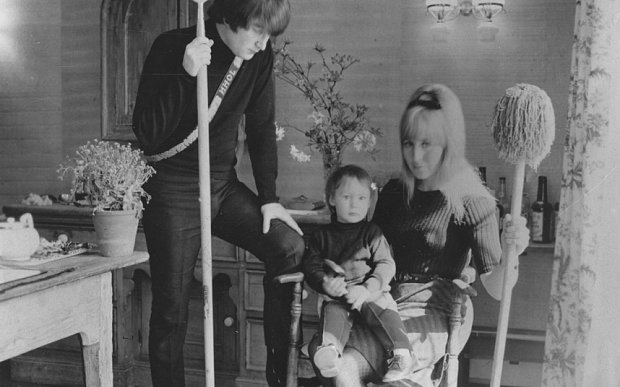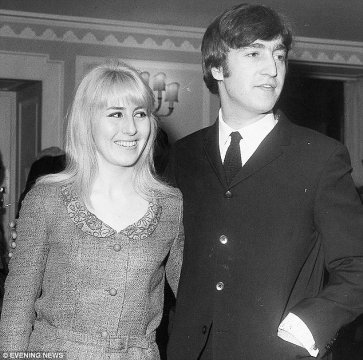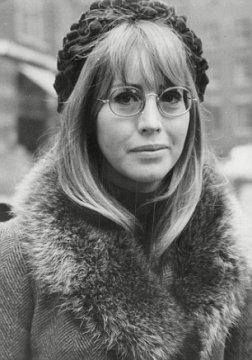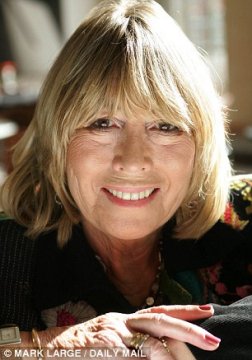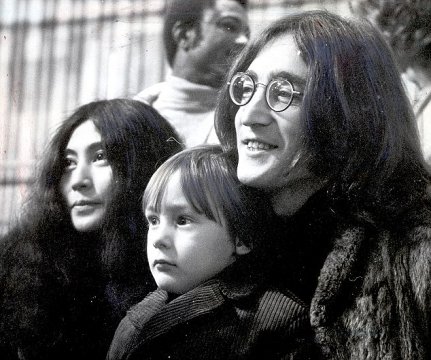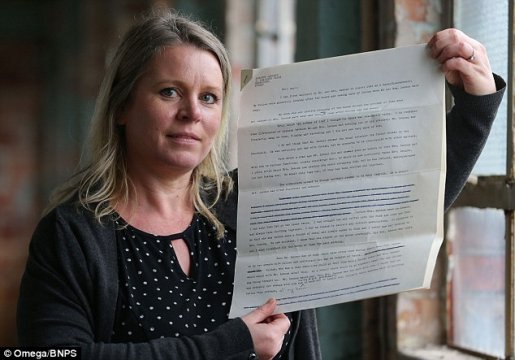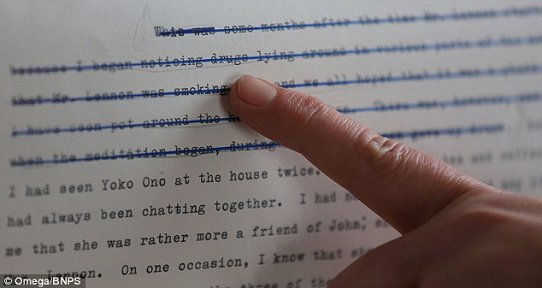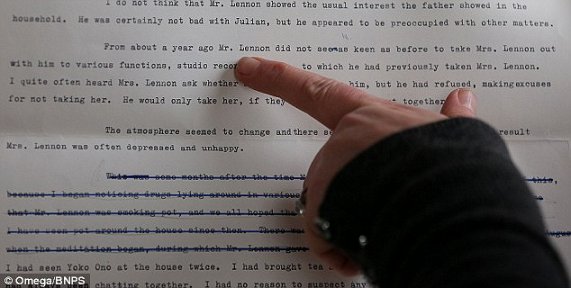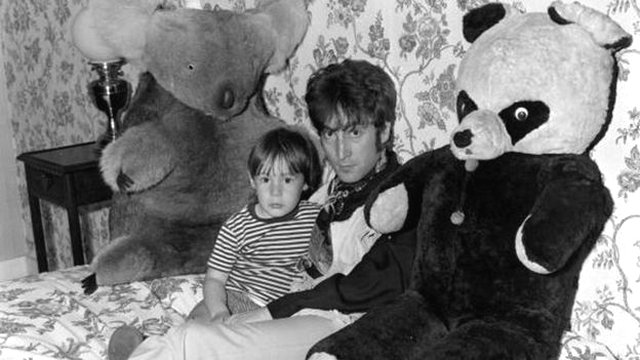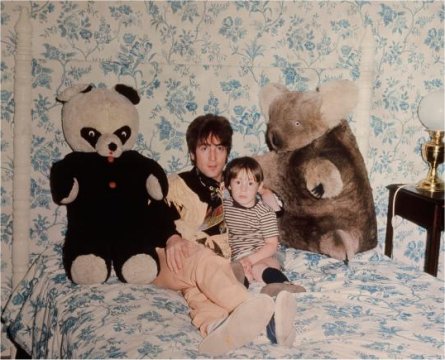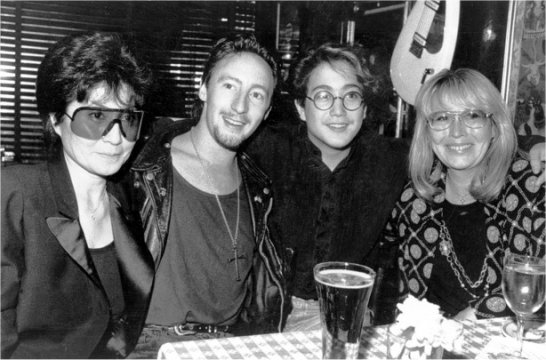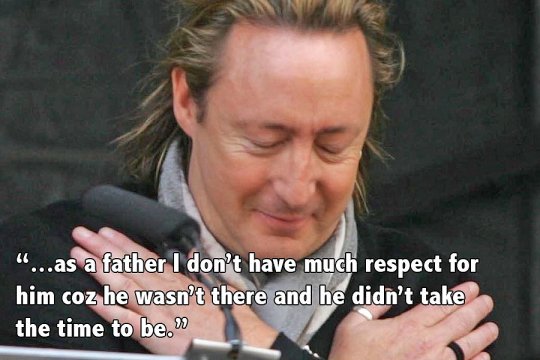By an unhelpful co-incidence, the two sons of
John Lennon released solo albums on the same day last week. In headline
terms, this could mean only one thing: the half brothers were engaged in
"open warfare" to determine which of them has inherited the creative talent
of their late father. It made a great piece of what they call "promo" in
the music business.
"It's news to me," says Julian Lennon mildly. "I love
Sean to death. He's a very smart kid. But I do think there are things done
without his knowledge. Someone in the camp could be manipulating events."
By this, he means the New York-based Lennon "camp", under the control of
Yoko Ono, Lennon's widow and the mother of Sean. "She wants to make sure
Sean's OK, whatever it takes."
Julian Lennon doesn't strike you as a conspiracy theorist.
His quietness isn't throbbing with menace or malice. He appears to be a
puzzled chap asking two puzzling questions: is it really a coincidence
that Sean's album Into The Sun came out on the same day as his own Photograph
Smile?
And how come that the day before he broke a seven-year
silence by introducing his new songs at a press conference in Germany,
his half-brother Sean created a media diversion by talking about his father's
assassination?
"Very weird," says Julian.
Julian, 35, is the Sixties child of John Lennon and his
first wife, Cynthia; he was abandoned by his father when he was five and
only recently received a share of the vast Lennon estate.
Sean, 22, is the favoured son, for whom John Lennon became
a househusband. He lives with Yoko in the sumptuous Dakota building in
New York, where Lennon was shot in 1980, and will inherit the bulk of the
Beatle's reputed £220 million fortune.
"If I'm in New York, I try to see Sean," says Julian.
"If I move, I always give him my new number. I call him from time to time,
but I never get a return call. I think it's to do with the difference in
our ages. The last thing he's thinking about is his older brother."
Julian Lennon is not always so ready to make allowances.
When people come up to him in the street, blabbing about their love for
his father, "because he spoke the truth", they meet with a polite reserve.
"I have to say that, from my point of view, I felt he
was a hypocrite. Dad could talk about peace and love out loud to the world
but he could never show it to the people who supposedly meant the most
to him: his wife and son. How can you talk about peace and love and have
a family in bits and pieces - no communication, adultery, divorce? You
can't do it, not if you're being true and honest with yourself."
Lennon has a way of delivering vehement thoughts as if
they were the shipping forecast. He sits casually smoking and smiling,
distilling the essence of what it has meant all these years to be the outsider,
burdened with expectations on the one hand, stripped of status on the other.
He picks occasionally at the quicks of his fingernails, but his voice doesn't
change much. It's the same unemphatic Northern threnody, attractive in
its way, whatever his subject.
A careful civility veneers all his utterances about Yoko
Ono. He calls her "a hardball, a very strong woman. I admire her - she's
a tough cookie - but I don't necessarily agree with her". He even suggests
that she may have done him a favour by waiting 16 years before allowing
him any money from the estate.
In the original divorce settlement, Julian was to receive
£2,400 a year in maintenance and to inherit a £50,000 trust
fund when he was 25. After a long legal wrangle, he secured a further settlement
from the estate in 1996, the details of which he is forbidden to discuss.
"No," he says, "I don't think it was necessarily fair, but I'm OK. The
last thing I wanted was a court battle because there's much more money
on the estate side than my side.
"A court case could have gone on for five years. The slanderous
remarks would have been horrific. There would not have been a private life
for either Sean or me. I just wanted to resolve it, to get the hell out
of there; a chapter in my life finished, over with."
Is it as simple as that? "Well, I have been dealt a set
of cards I can't change too much. But maybe I can make them into a winning
hand later."
He didn't much care about the money, he says wearily;
it was the principle of the thing. He's not after a sympathy vote, but
what he found really sad was the lack of any personal mementoes, "seeing
nothing offered to me at all, having to go out and buy back Dad's stuff
with his money".
He recently paid £30,373 for the Afghan coat John
Lennon wore on the cover of the Magical Mystery Tour album in 1967; £17,246
for a black velvet cape (worn in the Beatles' film, Help!), and £25,000
for the scribbled notes of the song Hey Jude, written by Paul McCartney
for Julian when his parents were splitting up.
Paul once observed that John didn't really know how to
be a dad. Does Lennon think it is fair to blame someone for being a poor
father?
"Yeah, I do."
We are all, he argues, capable of doing what we set out
to do. "If you bring a child into this world, whether it's planned or an
accident, you'd better make sure you can care for it. You have to be around.
You make time. It's as simple as that."
After many years of caring for Julian alone on a small
allowance, Cynthia Lennon reminded her famous ex-husband that he also had
a son in England. A few awkward meetings ensued, Julian always having to
do the Atlantic hop. According to sentimental legend, just as father and
son were getting to know each other, Lennon was shot. But Julian doesn't
make it sound all that promising a relationship.
"It was still very distant. I probably knew him as much
as I know you. That's about how warm it was. There were cuddles now and
then but there was always an uneasy tension."
He believes the unease sprang from his father's guilt
at being an absentee parent. "That is why, with Sean, he made sure he spent
every moment with him." But this is too simplistic for Julian, who continues
his calm indictment: "You cannot just discard people because you can't
face up to them. You cannot say: 'Here's my new life. I'm older, I understand
more, I'll make it better now.' It doesn't work that way."
Julian Lennon remembers once sharing the upbringing of
a girlfriend's baby and how, despite the broken nights, he loved being
a surrogate father. "It was phenomenal, magical. I know bringing up a kid
is tough, but I cannot understand how anyone - not just dad - can walk
away from that. After the relationship broke up, I think I missed the child
more than I missed his mother."
Early pictures of Julian show a long-faced pasty youth,
whose features are a bland, unformed copy of his father's. Though still
wan, he looks more interesting now, and the likeness to his father is disappearing.
After the success of his first album, Valotte, he hated the way the record
industry tried to dish him up as the reincarnation of Lennon.
"They tried to create this image. It was like being a
puppet, a pawn being shifted around. To me, it was about the songwriting,
the songs. But nobody wanted to hear that. They just wanted to see me and
touch me and play with me and ask me questions about Dad. For many years,
I went along with it. I was too nice.
"I could have been the nastiest son of a bitch you ever
met, but I chose not to take that route. I did have that anger inside me.
I did have that [his father's] laconic wit - but it's in its place." Having
suffered himself from his father's clever tongue, he says he'd rather not
use his own to "tear someone up". As in all moral dilemmas, he took his
cue from Cynthia Lennon. "My mum taught me how to turn everything around:
you just kill people with kindness. There is no need to be mean, nasty
or cruel to anybody."
Cynthia now lives in Normandy with her companion of the
past 16 years. "She's loving life and I'm very happy for her. Of course,
there are things that hurt inside - there's still a place in her that loves
Dad - but she's over any anger. There's no great trust between her and
Yoko, but we rarely talk about that these days. Mum's very grounded; I
think there's more insecurity on the other side."
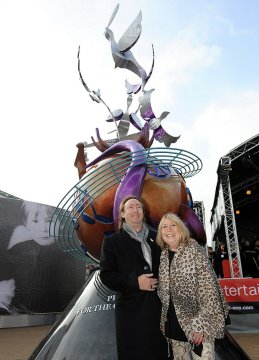 As
Cynthia moved home, her son went to many different schools. It was always
the same agony: being introduced in assemblies as the son of John Lennon,
blah, blah, blah, and then being ambushed by local gangs on the way home.
As
Cynthia moved home, her son went to many different schools. It was always
the same agony: being introduced in assemblies as the son of John Lennon,
blah, blah, blah, and then being ambushed by local gangs on the way home.
"Trying to make friends in those days, particularly when
we were in North Wales, was tough. Every school was a nightmare. Often,
when a friend and I went to the fish shop at night, there would be 10 or
20 guys outside just waiting for us. They wanted to be violent and I felt
aggression inside. But I would talk just long enough to distract them,
just long enough for me to throw the chips in the air and run.
"Rumours would go round town that I pinned £5 and
£10 notes on the ceiling for fun. They thought we had millions in
the bank, but we never had any money when I was a kid. Mum had enough from
Dad for schooling, food and clothes. That was it. Later, the only money
I had, I earned."
Julian claims that he doesn't care if he never makes another
album. "There's life outside the music business. After being on the treadmill
for 10 years, I value other things more than I did before: friends, love,
relationships."
His independently-made Photograph Smile (on the Music
From Another Room label) is dedicated to his Italian step-father, Roberto
Bassanini ("more of a father to me than anyone"). To Julian, it symbolises
cutting loose from the messed-up, manipulated, lost-boy Lennon and emerging
in his own adult colours.
"For me, it's my first album. It feels like the perfect
representation of the work I do. Without being snotty or modest, I think
it contains some very good songs. My goal in life has been to be a songsmith,
not a pop person."
He blames the frenetic music business for locking him
into the alternating hyperactivity and lassitude that characterised his
life in the late Eighties. "It got to the point where you didn't get up
in the day, you didn't work, you didn't do anything because you were so
screwed up. But I've never been addictive in anything, and I looked in
the mirror and saw it was time to stop. There's a piece of me that stays
aware at all times."
The turning point came in 1994 when he travelled to London
to accompany his mother to the premiere of Backbeat, a film about the Beatles.
It made him see how stagnant his life had become. So he put his house in
Los Angeles on the market and "booked out" of America, renting a flat in
Monte Carlo as a base for exploring the countryside and himself.
He eventually bought a house by the lakes in northern
Italy, "where I'm pleased no one seems to know me at all". Then, with the
settlement money, he bought a second-hand Range Rover and did up his 1969
rust bucket, a Mustang convertible. "I was never the kind to buy the Ferrari
or the yacht. There's no big house anywhere."
All in all, the cards seem to be falling right. After
years of short-lived love affairs, he says he has found the woman of his
dreams. "I've always been trying to find that one person. Now I have, I
want to keep the secret as long as possible."
The conversation drifts amiably on to his love of sailing,
cooking, riding his motorbike into the hills, discovering little towns
and poking into village kitchens. "I love to sit on a mountain top and
gaze," he says. "I don't think of anything but the people I care about
and the view. At the age of 35, I've found the first step to contentment
and peace."
PART II
Never-before-seen papers from John Lennon's bitter
1968 divorce
give inside account of Beatle's drug abuse, affair
with Yoko Ono
and aggressive behaviour towards his young son Julian
Five-page document was drafted by Cynthia Lennon's divorce
lawyers centres on claims made by Lennon's longtime housekeeper Dorothy
Jarlett. She revealed what she saw while working at Lennon family
home in Surrey. Details visits by Yoko Ono, mood swings and increased drug
taking. Papers expected to fetch £5,000 when they go up for auction
next month. Suggestion Lennon family might buy it to stop it being widely
published
Daily Mail
~ February13, 2015
A never-before-seen dossier detailing the bitter breakdown
of John Lennon's marriage to his first wife Cynthia has been uncovered
after nearly 50 years.
The five-page document, drafted by the solicitors dealing
with the Beatle's divorce in 1968, reveals details of his increasing drug
use and his affair with Yoko Ono.
It centres on claims made by Dorothy Jarlett, Lennon's
housekeeper of four years, on what she saw while working at the Lennon
family home Kenwood in Weybridge, Surrey.
The papers, which will go up for auction next month, also
details his mood swings, aggressive behaviour towards his young son Julian
and heated arguments between him and Cynthia.
Breakdown: The papers reveal how Lennon became
nonchalant towards his wife Cynthia (pictured together) around 1967 - five
years after they tied the knot - when the Beatles were at the height of
their fame
Uncovered: The five-page document, pictured being
held up by Omega auction manager Karen Faireweather, was drafted by the
solicitors dealing with the Beatle's divorce in 1968
'Smacked': The document details John Lennon's mood swings,
aggressive behaviour towards his young son Julian (pictured with his father
and Yoko Ono) and heated arguments between him and Cynthia
'Smacked': The document details John Lennon's mood swings,
aggressive behaviour towards his young son Julian (pictured with his father
and Yoko Ono) and heated arguments between him and Cynthia
Mrs Jarlett describes how Yoko Ono would visit the country
pile while Cynthia was out of the country, and how she once found the pair
in bed together.
She reveals how Lennon became nonchalant towards his wife
around 1967 - five years after they tied the knot - when the Beatles were
at the height of their fame.
She said Lennon was uninterested in playing the father
figure role and that he would smack Julian if he misbehaved.
The statement was made to Herbert Oppenheimer, Nathan
and Vandyk - a firm of solicitors in London employed by Cynthia following
the breakdown of the marriage.
They then sent a draft version back to Mrs Jarlett, who
made amendments and crossed some sections out - marking the retracted statements
with a blue pen.
The document has never been seen before because Lennon
and Cynthia settled out of court, with Lennon agreeing to pay her £100,000
and give her custody of Julian.
Retracted: Mrs Jarlett made amendments to the
draft and crossed some sections out - including this one about Lennon's
drug taking - marking the statements she wished to withdraw with a blue
pen
It was found among Mrs Jarlett's possessions following
her death last year.
The documents are set to fetch £5,000 when they
go under the hammer at Omega Auctions in Warrington, Cheshire on March
24.
It has been suggested the Lennon family may buy the document
to stop it being widely published.
Mrs Jarlett, who worked for the Lennons for four years,
wrote: 'I was first employed by Mr and Mrs Lennon in August 1964 as nanny/housekeeper.
TEENAGE SWEETHEARTS: STORY OF CYNTHIA AND JOHN LENNON
Cynthia Lennon, nee Powell, grew up in a middle-class community
on the Wirral, met John Lennon while they were both students at the Liverpool
College of Art.
The pair married in 1962, when Cynthia was just 22, after
she became pregnant with their son Julian.
Beatles' members George Harrison, Paul McCartney, and
The Beatles' manager, Brian Epstein - who was best man - all attended.
The Lennons bought Kenwood, then a 22-bedroom home, in
Weybridge, Surrey, for £20,000 in 1964.
Kenwood became the place to visit for the other Beatles,
various American musicians and total strangers that Lennon had met the
previous night in London nightclubs.
While she had suspicions of Lennon's infidelity over the
years, with friends telling her that Lennon had had numerous affairs as
far back as their time together at art college in Liverpool, Cynthia ignored
the warnings.
According to housekeeper Dorothy Jarlett, Lennon became
nonchalant towards his wife around 1967 - five years after they tied the
knot - when the Beatles were at the height of their fame.
The Lennons' marriage troubles came to a head in February
1968 when Lennon drunkenly confessed to sleeping with other women during
their marriage.
Lennon suggested Cynthia take a holiday with friends.
She returned to find her husband sitting across from Yoko Ono on the floor
- staring into each other's eyes.
After years of trouble, the marriage finally ended in
August 1968 when Yoko Ono discovered she was pregnant.
Fearing a lengthy divorce process, the couple settled
outside of court, with Lennon agreeing to pay Cynthia £100,000 and
give her custody of Julian.
She learned of Lennon's death on 8 December 1980, while
she was staying with friends in London.
She married Italian hotelier Roberto Bassanini in 1970,
divorcing him in 1973. In 1976, she married John Twist, an engineer from
Lancashire, but divorced him in 1983.
'My duties were generally looking after the house and
taking care of Julian when Mr and Mrs Lennon were away.
'My work did not involve sleeping in the house except
for periods of time when Mr Lennon and Mrs Lennon were away and then only
to look after Julian and the house.
'Until about the summer 1967 I thought the house was reasonably
happy. I do remember some differences of opinion between Mr and Mrs Lennon
but nothing out of the ordinary.
'Mr Lennon was frequently away on tour, filming and recording
and I did not see very much of him.
'I do not think that Mr Lennon showed the usual interest
the father showed in the household. He was certainly not bad with Julian,
but he appeared to be preoccupied with other matters.
'From about a year ago Mr Lennon did not seem as keen
as before to take Mrs Lennon out with him to various functions, studio
recordings etc., to which he had previously taken Mrs Lennon.
'I quite often heard Mrs Lennon ask whether she could
accompany him, but he had refused, making excuses for not taking her. He
would only take her, if they had been invited out together.
'The atmosphere seemed to change and there seemed more
tension. As a result Mrs Lennon was often depressed and unhappy.'
In a section of text she later crossed out in blue pen,
Mrs Jarlett recalls how she discovered Lennon's drug taking habit after
he left packets of cannabis lying round the house.
She wrote: 'This was some months after the time Mr Lennon
started taking drugs, I knew of this, because I began noticing drugs lying
around in various parts of the house.
'It was quite clear to me that Mr Lennon was smoking pot,
and we all hoped that it was a phase and that he would get over it.
'I have seen pot around the house since then.'
Describing what she had seen of Yoko Ono, Mrs Jarlett
wrote: 'Before Mrs Lennon went to Greece, I had seen Yoko Ono at the house
twice.
'I had brought tea and coffee into the room and John and
Yoko had always been chatting together.
'I had no reason to suspect any illicit associations.
It appeared to me that she was rather more a friend of John; she always
spoke to John and I never saw her talking to Mrs Lennon.
'On one occasion, I know that she stayed at the house
overnight, but Mrs Lennon was there and I made breakfast for the three
of them the next morning.'
On a later page she told of how she found Lennon and Yoko
in bed together.
Mrs Jarlett also described Lennon's tough approach to
parenting, and that it was the source of arguments between him and his
wife.
Heartache: Cynthia Lennon pictured shortly after
her divorce to John Lennon in November 1968 (left) and in 2006 (right).
She went on to marry twice more - in 1970 and 1976
Collapse: This section of the document describes
the breakdown of the Lennons' marriage, as witnessed by Mrs Jarlett. Their
troubles came to a head in 1968 when Lennon drunkenly confessed to having
affairs
She wrote: 'When Mr Lennon was at home there were often
rows during meals when John seemed to be too severe with Julian and criticised
the way he behaved at table.
'Julian, who was a very sensitive child at the time would
become upset and Mrs Lennon would argue with Mr Lennon about this.
'As a result there would be an argument about the way
Julian was being brought up.
'MR LENNON WAS PREOCCUPIED':
DOROTHY JARLETT DESCRIBES THE LENNONS' MARRIAGE BREAKDOWN
'Until about the summer 1967 I thought the house was reasonably
happy. I do remember some differences of opinion between Mr and Mrs Lennon
but nothing out of the ordinary.
'Mr Lennon was frequently away on tour, filming and recording
and I did not see very much of him.
'I do not think that Mr Lennon showed the usual interest
the father showed in the household. He was certainly not bad with Julian,
but he appeared to be preoccupied with other matters.
'From about a year ago Mr Lennon did not seem as keen
as before to take Mrs Lennon out with him to various functions, studio
recordings etc., to which he had previously taken Mrs Lennon.
'I quite often heard Mrs Lennon ask whether she could
accompany him, but he had refused, making excuses for not taking her. He
would only take her, if they had been invited out together.
'The atmosphere seemed to change and there seemed more
tension. As a result Mrs Lennon was often depressed and unhappy.'
'Mr Lennon would say Mrs Lennon was too soft with him.
I think that he was probably not enough with his son at my house owing
to his profession to know how to handle him.
'Julian's table manners were if anything better than average.'
Mrs Jarlett crossed out a line from the paragraph stating:
'As a result he would often smack him'.
The Lennons' marriage troubles came to a head in February
1968 when Lennon drunkenly confessed to sleeping with other women during
their marriage.
He suggested Cynthia take a holiday in Greece, and when
she returned she found her husband and Yoko Ono sitting on the floor opposite
each other wearing only bath robes.
The nail in the coffin came in August 1968 with the news
that Yoko was pregnant.
Karen Fairweather, manager of Omega Auctions, said: 'This
sensational document has never been seen before - it was found among the
possessions of Dot Jarlett, the Lennons' long-serving housekeeper, following
her death last year.
'These papers were part of her estate but up until her
death no-one knew they were there.
'Dot's statement is a fly-on-the-wall inside view of the
life of the Lennons. Dot helped raise Julian and was probably the closest
person to John Lennon aside from Cynthia and Yoko.
'In fact she was so loved that John named their dog Bernard
after Dot's husband.
'The other parties involved in the divorce - John, Cynthia
and Yoko - are never going to reveal anything about it so this is the next
best thing.
'Dot was asked to provide an independent statement to
Cynthia's solicitors. Originally John sought divorce from Cynthia on the
grounds that she had committed adultery but as we all know it was the other
way round.
'Dot had been to the solicitors and given her statement,
and the solicitor has then drafted a document and sent it back to her to
check.
'But she thought it best to cross out the stuff about
John smacking Julian and his drug taking. Perhaps she thought it too controversial.
'Also, she was very close to John and would have felt
some sympathy for him.
'We've had a lot of interest in this from collectors already
and we are expecting plenty more, not just from the UK but internationally
too.
'It's not beyond the realms of possibility that someone
from the Lennon family might want to get their hands on it to stop its
entire contents coming out.'

